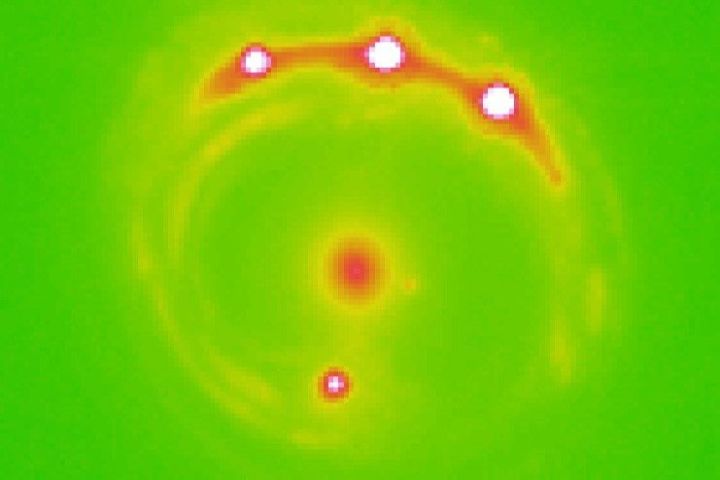
Findings from the research were recently published in the Astrophysical Journal Letters. The image above shows the galaxy at the center, surrounded by four quasars. It’s estimated there are several trillion planets in that central red dot.
Moreover, these appear to be “rogue” planets not circling a star in a conventional solar system but roaming free around the far-off galaxy.
“We are very excited about this discovery. This is the first time anyone has discovered planets outside our galaxy,” said OU professor Xinyu Dai. “These small planets are the best candidate for the signature we observed in this study using the microlensing technique.”
Einstein theorized that astronomers could use microlensing to observe distant objects using the gravity of stars that are directly between them and the Earth, Terry Oswalt of Embry-Riddle Aeronautical University told CNET. “When a star in the foreground passes exactly between us and a background star, gravitational microlensing results in a perfectly circular ring of light — a so-called ‘Einstein ring,'” he said.
The massive gravitational pull of an object like a star causes space to bend around it, and light from a more distant object would curve around it as well, resulting in a magnifying effect.
The astrophysicists used observations from NASA’s Chandray X-ray Observatory, a space telescope controlled by the Smithsonian. They then analyzed the results using the OU Supercomputing Center. Microlensing has been used to discover thousands of planets within the Milky Way before, but this is a new frontier.
“This is an example of how powerful the techniques of analysis of extragalactic microlensing can be,” said OU researcher Eduardo Guerras. “This galaxy is located 3.8 billion light years away, and there is not the slightest chance of observing these planets directly, not even with the best telescope one can imagine in a science fiction scenario. However, we are able to study them, unveil their presence and even have an idea of their masses. This is very cool science.”


